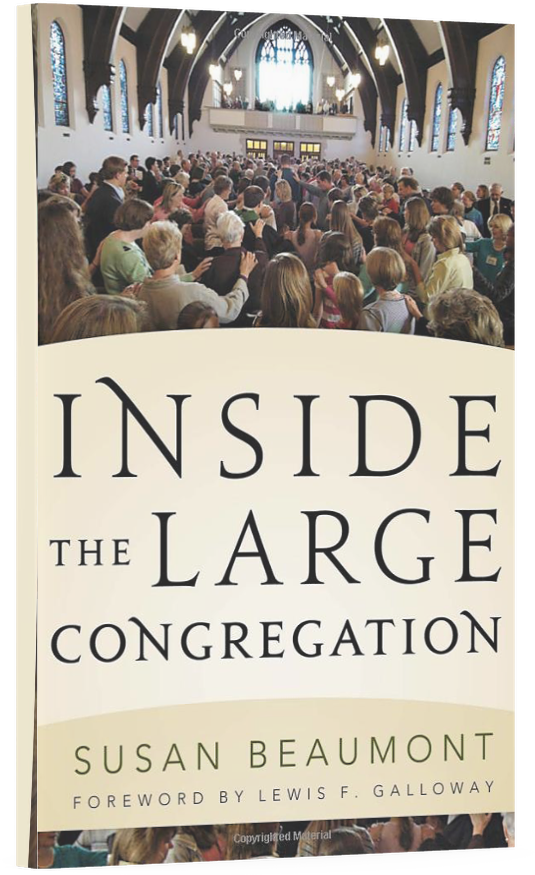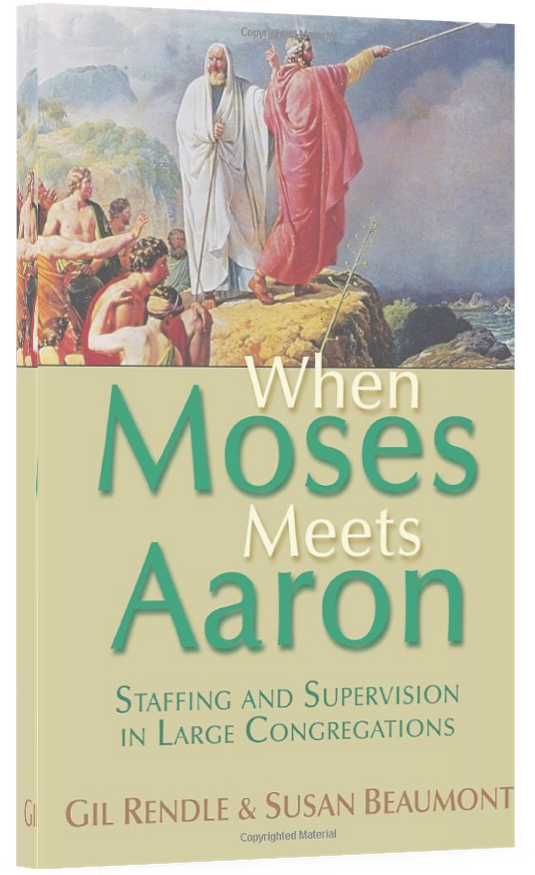We are living in a liminal season, a time betwixt and between an old order that we understood and a new era not yet defined. We are anxious and disoriented. When we are anxious it is hard to think expansively. Anxious leaders often take large issues and define them narrowly, making small decisions about consequential matters.
Deciding small things provides the illusion that we are in control. However, small-minded decisions will not help us to adapt, learn and grow. Now more than ever, we need the whole-hearted practice of spiritual discernment to enlarge our leadership responses.
Case in Point
Trinity Church is in a liminal season. The congregation has just begun a new pastorate with their first female clergy leader. Many are excited about this new era of leadership while others remain reticent. With this transition the congregation is experiencing a shift from authoritarian to participative  leadership. Additionally, denominational leaders are in debate about marriage equality and gay ordination. The congregation is also politically divided over the results of the recent election cycle. Everyone is on edge about how to make decisions in this environment.
leadership. Additionally, denominational leaders are in debate about marriage equality and gay ordination. The congregation is also politically divided over the results of the recent election cycle. Everyone is on edge about how to make decisions in this environment.
Amidst this larger turmoil, city officials have approached Trinity with a rental request. The city is proposing a lease arrangement for thirty church parking spaces to be used by city employees during the workweek. Trinity has the space to share but they aren’t sure they should. The increased traffic may place wear and tear on church property and could inhibit some of the midweek ministries of the church. Also, Trinity just learned that the city offered a better leasing arrangement to the church across the street.
The first inclination of the governing board was to make this a simple face value decision. Should the parking spaces be leased for the money offered? This framing of the decision led to a controlled conversation about offer, acceptance, value and fairness. After two-hours of debate, the board was prepared to reject the offer. It simply didn’t make financial sense.
This was a fine conversation, but was it the right conversation? The challenge before the board is larger than a simple fiduciary question about rental space. The parking proposal hosts a broad range of issues related to the congregation’s relationship with its city, its neighbors and its mission.
The board had full authority to make this decision on behalf of the congregation. However, before taking a final vote the leaders at Trinity decided to move out of decision making mode and into a discerning mindset.
The Lost Art of Discernment
The practice of discernment is an ancient spiritual practice that many congregations have forgotten, or perhaps never knew. Most governing boards rely exclusively on group problem-solving to engage their work.
Ruth Haley Barton defines discernment as the ever-increasing capacity to “see” the work of God in the midst of the human situation, so that we can align ourselves with whatever God is doing. Discernment is a quality of attentiveness to God that, over time, develops our sense of God’s heart and purpose in the moment. In communal discernment, we move beyond the personal to see what God is up to within the collective whole.
Decision making is largely an intellectual process. We define, analyze, evaluate and determine. Discernment is an activity that connects heart, head and spirit. As such it is more robust and leads to greater innovation.
Group discernment is guided via a carefully crafted process, one anchored in prayer and stillness, grounded in guiding principles and steeped in listening. Discernment moves toward choice, but only after the application of careful spiritual disciplines.
Reshaping Deciding into Discerning
Trinity located their discernment within the governing board while seeking input from the congregation. They decided to allocate four weeks for the discernment process. At the end of that time, in the absence of consensus, they would vote and a simple majority would rule.
Discernment began with careful framing of the topic. Discernment topics are typically framed more broadly than decision making topics. Trinity leaders chose to define their discernment topic as follows: “How is the city our neighbor? How is the city related to our mission?”
After framing, leaders took time to shed preconceived outcomes and biases. Through prayer, reflection and journaling, leaders set aside their convictions, personal histories and agendas, opening themselves to however the Spirit might lead.
Next, the discernment was grounded in important principles and core beliefs. Leaders looked at the history of the congregation and the city. They told stories about prior problems and opportunities with city leadership. They identified the core values of the congregation and how those values ought to inform this choice. They identified and weighed competing values. The considered their overarching mission. They sought the wisdom of scripture.
Discernment requires an intentional period of listening. At Trinity, congregants were invited into the conversation. The board hosted a town hall meeting where constituents were invited to weigh in on the discernment topic. Through the listening process a deep loyalty between the city and the congregation made itself felt. Leaders sensed a yearning for more connection with the community and its leaders.
Next, Trinity identified four viable options for moving forward: accept the offer as presented, reject the offer outright, counter the offer, or offer the parking spaces at no cost to the city. Each option was steeped in prayer and the group chose a spiritual discipline to evaluate viable alternatives. Trinity chose the Ignation practice of examen, using consolation and desolation as their guide.
Finally, the board moved towards closure. Every member of the board registered their level of support, objection or indifference to each alternative. Consensus emerged. A vote was only taken to make the choice official in the minutes of the church. Board leaders chose to accept the offer with a caveat defining specific access hours, to protect drop off and pick up at the church daycare. The decision was tested through rest and prayer before it was communicated to the congregation and the city.
Liminal seasons are frightening but also exhilarating. Something new is often being called forth that cannot be attended through simple decision making. The process of discernment invites us beyond the narrowness of our decisions and into the expansive possibility of a future more fully grounded in God.



